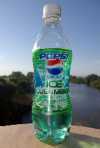Here is a quote from today's In the News. Because the content of In the News, in the left hand column, changes every day, the quote is included here:
Once-A-Day HIV Drug PromisingIdeas for Teachers and Students:
Today's drug treatments are quite effective at keepingHIV in check and improving the health and quality of life of those living with the disease; however, the often complex cocktails of multiple drugs must be taken at various times throughout the day, making it challenging to adhere to the regimen. Still, it is vital that patients do so, as missing doses can have serious consequences. A new once-a-day "quad" pill, which combines four different medications in a single tablet, was found to be both safe and effective in a recent study and could make it easier for HIV patients to take their pills as prescribed. More ...Discuss
- Students can check the details of this "story" about science with journal articles that are refereed laboratory reports.
- Students can see if there are any politics involved in approval and manufacturing of drug treatments like the one discussed in the quoted article.
- Students interested in sports or medicine can see if there were any famous patients involved in testing new drugs.
- Who were the original researchers working on the proteases involved in drugs for HIV? How has the internet and rumors on the internet aided or worsened their careers?
- Are there any incidents comparable to the McCarthy Era that relate to the pharmaceutical industry?
Well, these are some heavy questions that just might spark interest in science in someone who previously was uninterested or minimally interested in science.
Here are some more questions:
- Does the statement, " missing doses can have serious consequences," apply to medications other than those for HIV, too...antibiotics? TB medicines? malaria medicines? more?
- Why should aseptic technique be used?
- What is the value of quarantine? Do any countries use quarantine when it comes to HIV? Do any not? Why or why not use quarantine? What is your opinion? Can you back up your opinion with references from the technical, refereed, literature?
(c)J S Shipman 2012. All posts on this blog are copyrighted.









